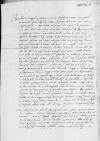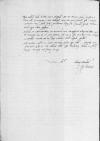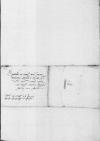Non possum me continere, quin aliquid scribam, praesertim tali amico, qui novit compati egenti. Quod scripsi, mercatores hic avisatos de provisione mea, hoc illud erat in fieri, non in facto. Thezaurarius iste ille written over hic⌈hicilleille written over hic⌉ purus Iudaeus ac usurarius Barensis promittebat de die in diem Johann Viol factor of Welsers in Bari⌊Io(anni) ViolaeJohann Viol factor of Welsers in Bari⌋ Bari (Barium, Status Barensis), duchy in southern Italy, on the Adriatic Sea, Bari was a hereditary country of Queen Bona of Poland⌊BariBari (Barium, Status Barensis), duchy in southern Italy, on the Adriatic Sea, Bari was a hereditary country of Queen Bona of Poland⌋ deponere provisionem meam et ille iam hic avisaverat suos socios, quod mihi praestare possent CCC-tos ducatos ob spem illius meae provisionis. Tandem nescio, quas cautelas Hebraeicas ille bonus vir exigebat ab eo, quibus eum ligare voluit. Et hactenus technis laboravit, et nec illos 300, immo nec istos 200, quos Bologna (Bononia), city in Italy at the southern end of the plain of the Po valley, between 1506 and 1860 it belonged to the Papal State⌊BononiaeBologna (Bononia), city in Italy at the southern end of the plain of the Po valley, between 1506 and 1860 it belonged to the Papal State⌋ accepistis, solvere curat. Habeat laudem Bona Sforza (*1494 – †1557), Queen of Poland and Grand Duchess of Lithuania (1518-1557); the second wife of Sigismund I Jagiellon; Duchess of Bari and Rossano; daughter of Gian Galeazzo Sforza of Milan and Isabella of Aragon⌊hera nostraBona Sforza (*1494 – †1557), Queen of Poland and Grand Duchess of Lithuania (1518-1557); the second wife of Sigismund I Jagiellon; Duchess of Bari and Rossano; daughter of Gian Galeazzo Sforza of Milan and Isabella of Aragon⌋ de his tam oboedientissimis officialibus et publicanis. Prope est, quod nec illi quidpiam dabunt, quandoquidem per tot annos nil penitus dederunt, neque illam curabunt, quae quantumcumque illis indignata fuerit. Et quis illorum erit, qui alterum castigabit(?). Scripsi ego Bona Sforza (*1494 – †1557), Queen of Poland and Grand Duchess of Lithuania (1518-1557); the second wife of Sigismund I Jagiellon; Duchess of Bari and Rossano; daughter of Gian Galeazzo Sforza of Milan and Isabella of Aragon⌊serenissimae maiestati suaeBona Sforza (*1494 – †1557), Queen of Poland and Grand Duchess of Lithuania (1518-1557); the second wife of Sigismund I Jagiellon; Duchess of Bari and Rossano; daughter of Gian Galeazzo Sforza of Milan and Isabella of Aragon⌋ huc sub dat(o) 13 Maii per mercatores Cracovienses unacum illis litteris Vestris, scripsi et ultima eiusdem per appotecarium Plocensem, scripsi et nuper XIX huius per Alexandrum, qui per Innsbruck (Oenipons), city in western Austria, Tyrol, on the Inn river⌊IsbrukInnsbruck (Oenipons), city in western Austria, Tyrol, on the Inn river⌋ cum canibus abiit, parvam, immo nullam, spem nos habere in thezaurario, si aliter sua maiestas de nobis non providebit. Et si illa non curabit, curabunt fratres mei, sed hoc meminisse iuvabit. Rogo Magnificentiam Vestram, si ibi venerint litterae Bona Sforza (*1494 – †1557), Queen of Poland and Grand Duchess of Lithuania (1518-1557); the second wife of Sigismund I Jagiellon; Duchess of Bari and Rossano; daughter of Gian Galeazzo Sforza of Milan and Isabella of Aragon⌊serenissimae maiestatis reginalisBona Sforza (*1494 – †1557), Queen of Poland and Grand Duchess of Lithuania (1518-1557); the second wife of Sigismund I Jagiellon; Duchess of Bari and Rossano; daughter of Gian Galeazzo Sforza of Milan and Isabella of Aragon⌋ aut de Bari (Barium, Status Barensis), duchy in southern Italy, on the Adriatic Sea, Bari was a hereditary country of Queen Bona of Poland⌊BarioBari (Barium, Status Barensis), duchy in southern Italy, on the Adriatic Sea, Bari was a hereditary country of Queen Bona of Poland⌋ vel de Naples (Napoli, Neapolis), city in Italy, on the coast of the Tyrrhenian Sea, capital of the region of Campania⌊NeapoliNaples (Napoli, Neapolis), city in Italy, on the coast of the Tyrrhenian Sea, capital of the region of Campania⌋, apperiat eas, et si quid erit de provisione mea, consulat cum The Welsers merchant and banking family from Augsburg with close ties to Emperor Charles V⌊dominis WelserisThe Welsers merchant and banking family from Augsburg with close ties to Emperor Charles V⌋, ut mihi hic Venice (Venezia, Venetiae), city in northeastern Italy, capital of the Republic of Venice⌊VenetiisVenice (Venezia, Venetiae), city in northeastern Italy, capital of the Republic of Venice⌋ respondeatur. Tamdiu hic manebo, donec habebo, si non a Bona Sforza (*1494 – †1557), Queen of Poland and Grand Duchess of Lithuania (1518-1557); the second wife of Sigismund I Jagiellon; Duchess of Bari and Rossano; daughter of Gian Galeazzo Sforza of Milan and Isabella of Aragon⌊reginaBona Sforza (*1494 – †1557), Queen of Poland and Grand Duchess of Lithuania (1518-1557); the second wife of Sigismund I Jagiellon; Duchess of Bari and Rossano; daughter of Gian Galeazzo Sforza of Milan and Isabella of Aragon⌋, saltem ab amiciis. Et tunc utcumque veniam ad vos omnino et per illam viam ibo. Interea tentabit adhuc aliquid de defensis Monteserico (Cascina Monte Serico), fief in Italy, feud belonging to the Italian inheritance of Bona Sforza, in Basilicata, now part of the commune of Genzano di Lucania⌊Montis SericiMonteserico (Cascina Monte Serico), fief in Italy, feud belonging to the Italian inheritance of Bona Sforza, in Basilicata, now part of the commune of Genzano di Lucania⌋, sicut(?) ante iam bis scripsi et informationem misi.
Nova nulla sunt hic praeter id, quod suspicantur omnes pestem et multae domus sunt infectae. Nuntius The Ottoman Turks (Turcae) ⌊ThurcarumThe Ottoman Turks (Turcae) ⌋ iam abiit bene honoratus ac donatus. Nuntius Charles V of Habsburg (*1500 – †1558), ruler of the Burgundian territories (1506-1555), King of Spain as Charles I (1516-1556), King of Naples and Sicily, King of the Romans (1519-1530), Holy Roman Emperor of the German Nation (elected 1519, crowned 1530, abdicated 1556); son of Philip I the Handsome and Joanna the Mad of Castile⌊caesarisCharles V of Habsburg (*1500 – †1558), ruler of the Burgundian territories (1506-1555), King of Spain as Charles I (1516-1556), King of Naples and Sicily, King of the Romans (1519-1530), Holy Roman Emperor of the German Nation (elected 1519, crowned 1530, abdicated 1556); son of Philip I the Handsome and Joanna the Mad of Castile⌋ Hispanus, qui hic est, retulit pro certo nuntio Francis I of Valois (*1494 – †1547), 1515-1547 King of France; son of Charles, Count of Angoulême, and Louise of Savoy⌊regis FranciaeFrancis I of Valois (*1494 – †1547), 1515-1547 King of France; son of Charles, Count of Angoulême, and Louise of Savoy⌋ Lazaro Balisto or Balisio⌈BalistoBalisto or Balisio⌉ XV huius relaxatos esse filios Francis I of Valois (*1494 – †1547), 1515-1547 King of France; son of Charles, Count of Angoulême, and Louise of Savoy⌊regis suiFrancis I of Valois (*1494 – †1547), 1515-1547 King of France; son of Charles, Count of Angoulême, and Louise of Savoy⌋, sed nondum in France (Gallia, Francia), the kingdom⌊FranciamFrance (Gallia, Francia), the kingdom⌋ traductos. Iste promittit hic mirabiles facere triumphos, quam primum aud<i>verit esse traductos.
Ego nullas litteras habui nec e Naples (Napoli, Neapolis), city in Italy, on the coast of the Tyrrhenian Sea, capital of the region of Campania⌊NeapoliNaples (Napoli, Neapolis), city in Italy, on the coast of the Tyrrhenian Sea, capital of the region of Campania⌋ nec e Bari (Barium, Status Barensis), duchy in southern Italy, on the Adriatic Sea, Bari was a hereditary country of Queen Bona of Poland⌊BarioBari (Barium, Status Barensis), duchy in southern Italy, on the Adriatic Sea, Bari was a hereditary country of Queen Bona of Poland⌋, quomodo successerit cum illis excompritis pro adohis, nec scio, qui faciunt istae umbrae. Valeant iam, nolo plus practicare cum eis. Faciant, quid velint, dummodo ego abire possem.
Saluto Bernhard von Höfen (Bernhard Flachsbinder) (†after 1548), Ioannes Dantiscus' brother, stayed with Dantiscus in Spain, as a member of his mission's retinue, and was used as a trusted courier to Poland at least from 1526; after 1530 Starost of Löbau⌊dominum BernardumBernhard von Höfen (Bernhard Flachsbinder) (†after 1548), Ioannes Dantiscus' brother, stayed with Dantiscus in Spain, as a member of his mission's retinue, and was used as a trusted courier to Poland at least from 1526; after 1530 Starost of Löbau⌋ et Jan Drzewicki son of Adam Drzewicki Castellan of Radom, nephew of Archbishop Maciej Drzewicki; Archdeacon of Pomerania; in 1526 received expectative for a Łęczyca scholasteria; from 1531 at least to 1546 scholastic at the collegiate chapter in Łęczyca; at least from 1537 scholastic at the cathedral chapter in Włocławek; at least from 1540 Canon of Cracow (MRPS 4/2, Nr. 14481, 16117; MARCINIAK, p. 48; MRPS 4/3, Nr. 18244, 23442)⌊DreviciumJan Drzewicki son of Adam Drzewicki Castellan of Radom, nephew of Archbishop Maciej Drzewicki; Archdeacon of Pomerania; in 1526 received expectative for a Łęczyca scholasteria; from 1531 at least to 1546 scholastic at the collegiate chapter in Łęczyca; at least from 1537 scholastic at the cathedral chapter in Włocławek; at least from 1540 Canon of Cracow (MRPS 4/2, Nr. 14481, 16117; MARCINIAK, p. 48; MRPS 4/3, Nr. 18244, 23442)⌋ meum et afferam aliquid illis mecum e Venice (Venezia, Venetiae), city in northeastern Italy, capital of the Republic of Venice⌊VenetciisVenice (Venezia, Venetiae), city in northeastern Italy, capital of the Republic of Venice⌋, et Dominationi Vestrae, quae potero. Frater meus est Padova (Patavium, Padua), city in northern Italy, Veneto, on the Bacchiglione river, 40 km N of Venice⌊PadvaePadova (Patavium, Padua), city in northern Italy, Veneto, on the Bacchiglione river, 40 km N of Venice⌋ cum Dluski in studio, veniam ad vos cum omnibus, sed nescio, quando.
Nil solvat Magnificentia Vestra huic portitori, solvi ego illum. Commendo me plurimum Magnificentiae Vestrae, et utinam illam cito videam sanam et felicissimam.



 UUB, H. 154, f. 24v
UUB, H. 154, f. 24v